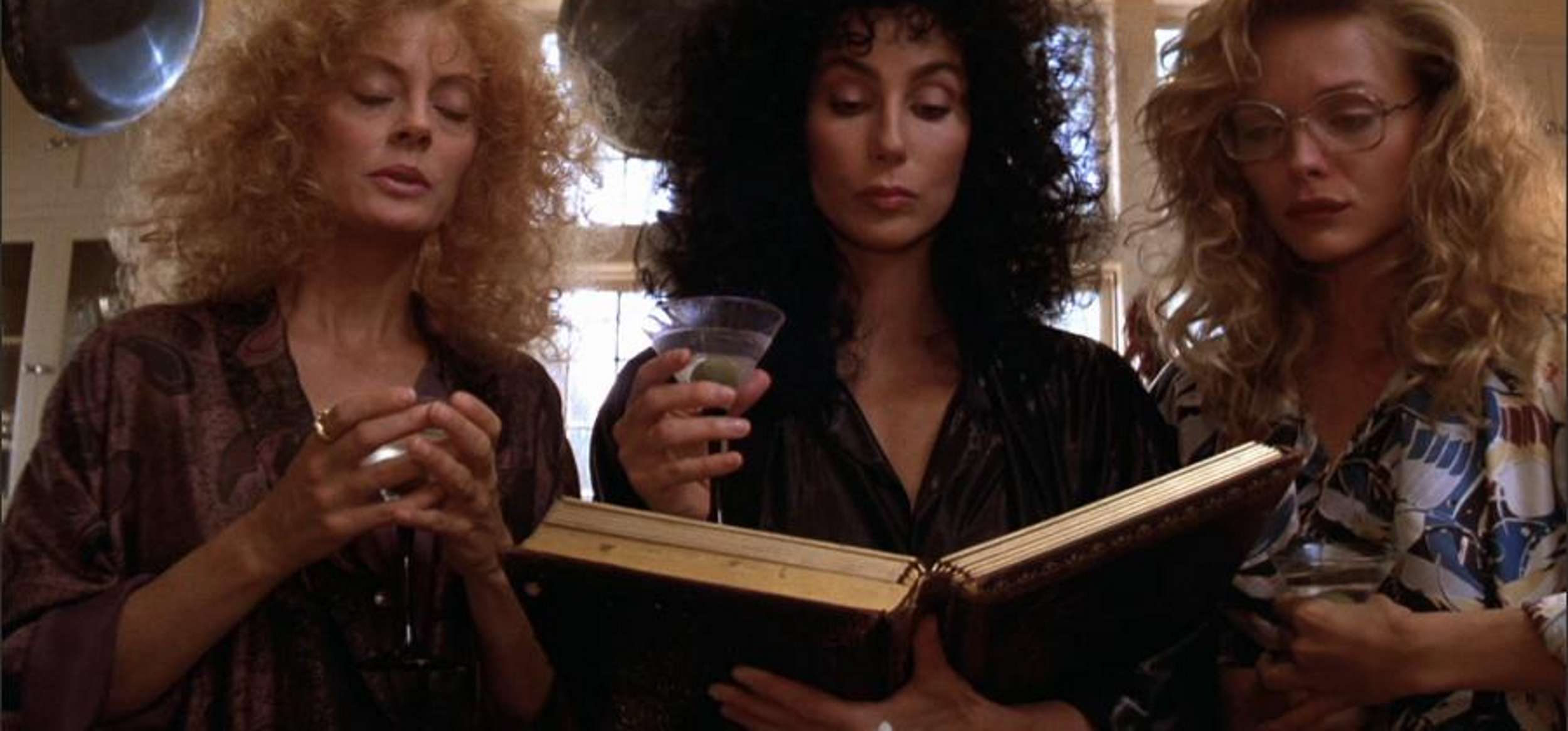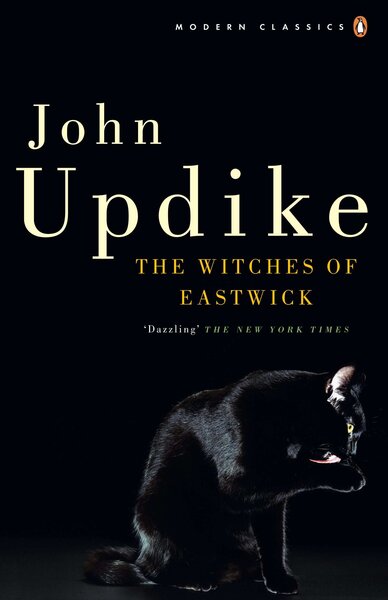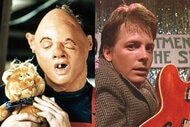Create a free profile to get unlimited access to exclusive videos, sweepstakes, and more!
The enduring story of the Witches of Eastwick and their horny little Devil

Whenever literary critics debate who were the greatest American writers of the 20th century, it's probable that the name John Updike will appear. One of only four writers to win the Pulitzer Prize for Fiction more than once, the novelist and critic is widely seen as one of the most important authors of his time. His influence is wide-reaching, and his books are often compared to the likes of Vladimir Nabokov and Marcel Proust. In short, he is a big deal. He was also, how shall we put it, not great at writing female characters. Even his greatest fans often ceded way to the reality of his questionable depictions of women. The debate as to whether his work was misogynistic continues to this day, but it's tough to deny that Updike's deft and complex male characters greatly outshine their female counterparts.
That is partly what makes the existence of The Witches of Eastwick so fascinating. How did the Great American Writer who often seemed to think of women as unknowable sex objects end up writing a book about witches tackling 1960s puritanism and the cusp of the sexual revolution?
Updike himself admitted that the book, which was published in 1984, was an attempt to "make things right with my, what shall we call them, feminist detractors." Whether or not he did that remains to be seen, but the novel became one of his most commercially successful titles and added a more playful shade to his public reputation. He even wrote a sequel in 2008, The Widows of Eastwick, which would be his final novel before his death the following year.
Updike called The Witches of Eastwick his novel "about female power, a power that patriarchal societies have denied." Depending on who you ask, the book is either a stridently pro-feminist satire that takes women's politics of the time seriously, or it's another example of an important male writer who seems unable to view women as much more than trite cliches. It's rare, however, that such contentious narratives take on a life of their own and evolve into something far fizzier and more simply enjoyable than intended, but The Witches of Eastwick has so far spawned a movie adaptation, a TV series, a musical, and many a Halloween costume.
Updike's novel takes place in the fictional Rhode Island town of Eastwick in the late 1960s. The central witches are Alexandra Spofford, Jane Smart, and Sukie Rougemont. All three are single women, having been either abandoned by their husbands or left as widows, and they are mothers to numerous children. In the cloistered and puritanical town of Eastwick, they are outcasts, women to be scorned, and watched carefully for signs of trouble. The townsfolk, who are living in a state of pseudo-denial over the ongoing Vietnam war and changes brought to America by the Swinging Sixties, don't know the trio are witches, but they do know that they are proud seductresses. They keep multiple married lovers and do as they please when it comes to their sexual mores. Things take a drastic turn when a mysterious man named Darryl Van Horne arrives in Eastwick and buys a crumbling mansion on the outskirts of town. Van Horne is arrogant, foul-mouthed, utterly lacking in tact, and smells bad. He's also possibly the literal devil, and he quickly seduces the witches and encourages them to wreak havoc through town. Soon, their powers grow to the point where everyone is bewitched by them on some level, but their bliss cannot continue unchecked.
The central hook of The Witches of Eastwick is obvious. Who doesn't love a classic witch story? The trio of Eastwick women are undeniably alluring in their appeal: beautiful, sexually liberated, blessed with incredible powers, and stronger as a coven than apart. All that and they get to bang Satan? We're in. Updike seems most interested in how these women are dismissed by the world at large. Their creative endeavors are ignored or mocked and their love lives picked over with unnecessary attention. Even if they couldn't perform magic, they would still be described as witches by Eastwick's locals because women who do not fit societal norms have always been decried in such a manner. The witches are offered the chance by Darryl to live freely, to play and engage in pleasure without consequence, or, at the very least, a version of freedom wherein the consequences don't impact them. The town busybody Felicia suffers, as does her daughter Jenny. When the latter arrives in town, naive but clearly capable of something darker, the witches take her under their wing and let her indulge in their hedonism. Then she has the audacity to fall for and marry Darryl, so the women curse her with metastatic ovarian cancer. Jenny dies, Darryl flees Eastwick with Jenny's brother, and the women eventually leave town after summoning new husbands for themselves. The almighty sisterhood is shattered by, yes, petty man issues. If it's supposed to be a satirical commentary on something, I'm not sure who Updike's targets were. His tale of women battling the smothering confines of patriarchy ends as yet another story where those damn jealous women become obsessed with a d*ck (yes, there's a lot of phallus worship in this book. That's Updike's thing.).
For the 1987 film adaptation, directed by George Miller of future Mad Max: Fury Road fame, the crew decided to go in a more conventional direction. Jenny is gone, the women are much more easily sympathetic, and the tone is more akin to a romantic comedy than the novel's bleak perversity. The witches are far more glamorous, played by the astoundingly gorgeous trio of Michelle Pfeiffer, Susan Sarandon, and Cher. Darryl, meanwhile, is less a casual agent of chaos than an active enabler for the women, who don't discover their powers until they shack up together at his mansion. The ending is far more ludicrous and fantastical too, but overall, this is still a story of female friendship and a horny little devil.
I must confess that The Witches of Eastwick is one of my all-time favorite films. It's a go-to comfort movie, one that I could watch anytime, anyplace, and always be satisfied. Stories of women dealing with constrictive societal bulls**t and choosing to live freely in the face of derision will always be appealing to female audiences. Alas, it's a notion that has yet to lose its relatability, even as we gain more rights in the face of political and social pushback. These are women who just want to put themselves first for a change. They don't want to hurt anyone, although they end up causing quite a bit of damage, and they don't want to eschew goodness in favor of satanic delights. All they want is to enjoy their lives, their powers, and their romances.
Even stripped of the book's more suspect elements, the film still spends a lot of time with Darryl Van Horne, who is of course played by Jack Nicholson. He negs the women more than he seduces him, but what he offers is still enticing. The trio wanted a guy who would take them seriously and he certainly does that. He plays a carefully constructed game that seems both repulsive and hypnotic, such as when he seduces Alexandra by essentially offering himself up as a tool for her to vent her frustrations with her boring life. Darryl is fun to be around, an uncouth and all-too-honest contrast to the lecherous or thuddingly-dull men of Eastwick. Then he gets them all pregnant, and when they try to pull away from him after the locals begin a campaign of slut-shaming against them, he turns into a manipulative monster. This devil may have been appealing at first, but it doesn't take long for Darryl to reveal himself to be little more than a petulant creep, yet another predictable man whose supposed respect for women is built on whether or not they provide easy access to their lives. The women are forced to find a way to banish Darryl, but his legacy lives on in their sons, who may or may not one day pick up his mantle.
Both the TV adaptation from 2009, which lasted one season, and the musical version from 2000 play into those ideas and themes. The ABC series tried to combine the witchy aspects with a more Desperate Housewives-style narrative but struggled to balance the supernatural allegory with the soapy drama and real gender issues at play. The musical brings back Jennifer but mercifully doesn't kill her off. Instead, she is Darryl's way to get revenge on the witches when they abandon him. They're also much more vengeful on stage than on screen, giddily cursing everyone who pisses them off. While neither adaptation is as complete as the film and both basically ignore the book, they are all tied together by their central allure: power.
At its heart, The Witches of Eastwick is a power fantasy. If women are going to be called witches or other derogatory terms for simply living their lives outside of the restrictions of patriarchy, then why not have some real fun with it? There will always be an allure to the notion of giving into one's baser instinct, tossing aside the dreary conventions of polite society, and being free in a way that is still judged wrong or suspicious by the world at large. John Updike may not have fully understood women, despite his best attempts, but he certainly knew that there will forever be something thrilling about the freedom of women who just don't give a f**k.















